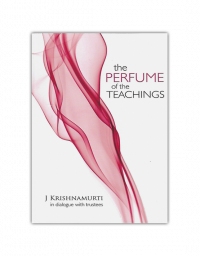The Perfume of the Teachings J Krishnamurti in dialogue with trustees
In 1977, Krishnamurti met with a group of Trustees of the Krishnamurti Foundations and, for more than a month, talked to them about the importance of living the teachings and thereby keeping it alive in the schools and adult study centers he had founded. ‘The very teachings are sacred, holy. The investigation of that teaching leads to, or brings about, the truth, which is holy. And if we are committed to that, to the investigation of the teachings and the discovery of that truth which is holy, then we are responsible to that’, he says in different ways in the eleven dialogues that form the contents of this book. The very titles of the chapters are revealing: ‘The teachings cover the whole field of life’; ‘You are responsible for a treasure’; ‘You have drunk at the fountain’; ‘Can this be kept alive flowering forever’; ‘Don’t come to the well with a small bucket’; ‘Can you convey that perfume?’ Those who are familiar with Krishnamurti’s life and work would notice that in these dialogues he emphasizes for the first time the importance of having study centers for adults—ashrams in the ‘original sense of that word’, as he puts it elsewhere.

